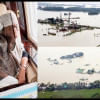Prioritise flood-affected people in remote areas

We are concerned about the 36,500 families in Chattogram who are badly affected by the ongoing floods. With homes under water and many roads still closed, the situation in this region, especially its remote areas where help is yet to reach, is certainly grave. As rain continues, more landslides may occur, which means that those who used to live in hilly regions cannot go back home anytime soon. With floodwaters receding in some areas, waterborne diseases such as diarrhoea, jaundice, typhoid and skin conditions are spreading, adding to the overall miserable conditions of the people. While the government and non-government organisations (NGOs) are trying to tackle the situation through rescue and relief efforts, there are still gaps that need to be filled.
In Bandarban, especially, where roads have been closed off because of landslides, many people are still without safe drinking water, electricity and mobile networks. Government and NGOs have still not been able to reach these areas. The government must find ways to immediately send relief items such as food, clean water, clothing and medicine to people. Medical teams must be formed and sent to areas where diseases have broken out to help the local medical staff in treating the patients, many of whom are children and the elderly.
These are the short-term measures that must be taken on an urgent basis. But it is only after the floods recede that the true devastation will be revealed. Many homes and buildings, including schools, will be found to have been washed away while infrastructure such as roads will be left damaged. The government must coordinate a comprehensive long-term rehabilitation plan so that people can stand on their feet again. This must include repairing roads, dams and other infrastructure and rebuilding homes and schools that have been destroyed or washed away. The government will have to provide the affected families with cash support, jobs and resources that provide livelihoods such as ploughs, cattle, boats and nets. Farmers who have lost huge amounts of crops must be given support such as seeds, fertiliser and equipment.
Finally, the government, with the help of its partner organisations and experts, must evaluate their disaster management strategies to see whether they need to be strengthened, such as building more multipurpose shelters and intensifying awareness programmes, so that people are better prepared in the wake of another flood in the future.


 For all latest news, follow The Daily Star's Google News channel.
For all latest news, follow The Daily Star's Google News channel. 









Comments